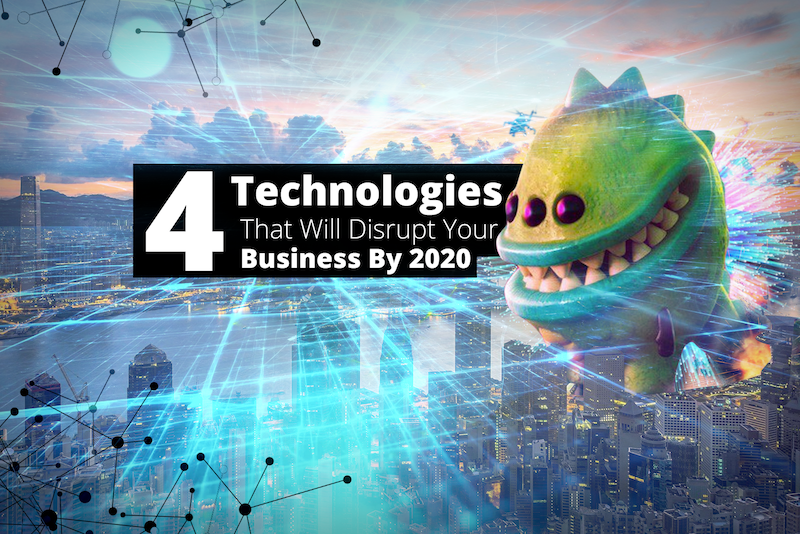
As the year 2020 rapidly approaches, expectations are high within the technology community when it comes to the impending decade.
As a result, a few studies have been conducted to ascertain how IT leaders anticipate technology will disrupt business and help transform it forever.
For this post, I will be focusing on the results presented in KPMG’s recent findings from their annual survey of 800 global technology industry leaders and the Salesforce’s second annual State of IT report where over 2,200 IT leaders discussed their expectations for the future.
So what does the future hold?
Let’s take a look at the following four technologies and trends that will disrupt businesses by 2020.
1. Next-Generation AI
Technology industry leaders believe that we are about to experience the next wave of artificial intelligence (AI) that will be driven by increasing processing power. This means that AI will be enabled to better mimic how humans learn, understand, reason, and make decisions. As a result, you can expect it to be better ingrained in everything we do.
The primary driver of AI will be the digital transformation of business to enhance efficiencies and productivity. The secondary driver here will be cost reduction and rapid innovation cycles.
AI is also expected to have the biggest impact on the financial services industry and the technology industry. According to IDC, about $46 billion will be spent on AI and cognitive systems by 2021 (and it’s expected to reach $12.5 billion this year, 50% higher than 2016).
2. The Internet of Things (IoT)
Technology leaders also expect IoT to play a larger role going forward as connected devices become smarter. As a result, IDC predicts that the market will grow by 17% this year compared to last year.
IoT is expected to transform businesses (just like AI) and make them more efficient, productive with faster innovation cycles. According to IDC, this will translate into $1.4 trillion spent on IoT technologies by the year 2021.
On a global scale, IoT ranked the highest in both India and South Korea because of their large populations (especially in India) and the growing number of millennials in the region.
3. Mobile Customer-Facing Technology
In today’s mobile-first world, it can be quite difficult to find initial customer interactions that occur outside of web or mobile. It doesn’t come as a surprise as our smartphones are now ever-present in our lives working as a robust tool for communication, productivity, and work/life management.
According to Salesforce, 50% of consumers and 57% of business buyers are likely to switch from brands that don’t offer a highly user-friendly mobile experience. As a result, it’s important to consider the fact that both employees and consumers alike have high expectations when it comes to their mobile experience in terms of the following:
- Performance
- Real-time access to contextual data
- User experience (UX)
As a result, IT will be under significant pressure going forward as they will be charged with consistently delivering enhanced mobile experiences much faster than ever before. To achieve this, they will require next-generation mobile technologies to keep up with the ever-growing expectation of their target market.
4. Robotics
Robotics has experienced a considerable period of acceleration in recent years and its momentum is expected to keep growing going forward. Today, robots are loaded with more capabilities, intelligence and sensors and are now capable of successfully completing a lot of hazardous tasks that humans can’t or won’t do.
IDC predicts robotics spending to keep accelerating over the next few years to reach $230.7 billion by 2021 (that's essentially a CAGR of 22.8%). This suggests that the beginning of the next decade will be the crossover point where robots will be utilized for non-industrial applications.
Again, this technology is expected to boost productivity and efficiency, but much more than IoT to achieve rapid innovation cycles.
The convergence of all these technologies is expected to displace existing products and services and create new business opportunities along with new market value. It’s also predicted to have a considerable impact on how we work and live out our lives.
However, as IT teams are already under significant pressure and plagued by the lack of top talent, it will be a significant challenge for businesses to achieve their goals in the years to come. As a result, enterprises will have to look for established outsourcing partners to help them remain relevant in 2020 and beyond.
ARE YOU LOOKING TO OUTSOURCE THE DIGITAL TRANSFORMATION OF YOUR BUSINESS TO A PROFESSIONAL MOBILE DEVELOPMENT PROVIDER LIKE DIGI117? GET IN TOUCH!









